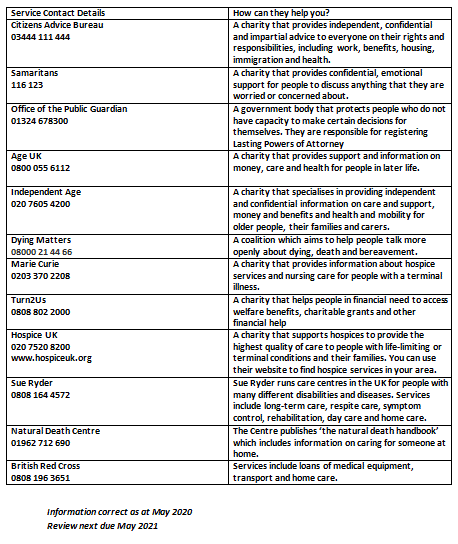This page has been put together to help patients and their families find out what’s involved in planning ahead, end of life care and what decisions they may face.
We appreciate there may be some difficult decisions to make so this information has been selected specifically from one of our GP’s to help you in choosing what’s right for you.
Please make sure you pick up one of our ‘planning ahead’ packs from reception. If you cant see any please ask.
Thinking about the future
Talking about your wishes for your care later in life can help ensure they are more likely to be fulfilled. Telling family members about your wishes can help if they ever have to make decisions about your care. There is lots of useful information and links below. Please talk to our clinicians if you would like to discuss things further.
- Advance statement – This is a written statement which expresses wishes about future treatment, to allow others to understand your wishes if you could no longer communicate them.
- Advance decisions (to refuse treatment) – This lets others know of treatments you do not want, in case you are unable to communicate this to them in the future. If you wish to refuse life-sustaining treatments this must be signed and witnessed.
- Do not attempt resuscitate decision (DNAR) – Cardiopulmonary resuscitation (CPR) is a treatment to attempt to restart breathing and blood flow in people who have stopped breathing or their heart has stopped beating. You can decide to refuse this but it needs to be recorded to make health care professionals and others aware of this decision.
- Lasting power of attorney – You can appoint someone to make decisions about your care in the future. They can only make these decisions if you are no longer able to make them yourself. Visit the link below for more information.
Palliative care
What is palliative care?
End-of-life care includes palliative care. If you have an illness that can’t be cured, palliative care makes you as comfortable as possible, by managing your symptoms. It also involves psychological, social and spiritual support for you and your family or carers.
Palliative care isn’t just for the end of life – you may receive palliative care earlier in your illness, while you are still receiving other therapies to treat your condition.
This short video will help you to make the most of your clinical consultations, help you understand that it is okay to have questions and how to communicate effectively within a complicated medical setting.
Who provides palliative care?
Many healthcare professionals provide palliative care as part of their jobs. It is part of our job and our nurses’ to care for palliative patients. Some people need additional specialist palliative care. This may be provided by consultants trained in palliative medicine, specialist palliative care nurses, or specialist occupational therapists or physiotherapists.
Palliative care teams are made up of different healthcare professionals and can coordinate the care of people by working together.
End of life care
What is end of life care?
End-of-life care is support for people who are in the last months or years of their life. End-of-life care should help you to live as well as possible until you die. The people providing your care should ask you about your wishes and your preferred plan of care. They should also offer support to your family members, carers or other people who are important to you.
You have the right to express your wishes about where you would like to receive care and where you want to die. You can receive end-of-life care at home, or in care homes, hospices or hospitals, depending on your needs. People who are approaching the end of life are entitled to high-quality care, wherever they choose to be cared for.
Who provides end of life care?
Different health and social care professionals may be involved in your end-of-life care, depending on your needs.
For example, hospital doctors, nurses, your GP, community nurses, hospice staff and counsellors may all be involved.
Community nurses will usually visit you at home and liaise with us, your family and friends may be closely involved in caring for you too.
When does end of life care begin?
End-of-life care should begin when you need it and may last a few days, or for months or years. People in lots of different situations can benefit from end-of-life care. Some of them may be expected to die within the next few hours or days. Others receive end-of-life care over many months.
People are considered to be approaching the end of life when they are likely to die within the next 12 months, although this isn’t always possible to predict. This includes people whose death is imminent, as well as people who:
- have an advanced incurable illness, such as cancer, dementia or motor neurone disease
- are generally frail and have co-existing conditions that mean they are expected to die within 12 months
- have existing conditions if they are at risk of dying from a crisis in their condition
- have a life-threatening acute condition caused by a sudden catastrophic event, such as an accident or stroke
How do I find out about end of life care services in my area?
If you are approaching the end of life, or caring for someone who is, and you want to find out about the care and support available, we have an End of Life pack you can pick up in surgery. This is made up of local services with support and advice to help you gain all the information you need to make the right decision for you. Please visit the ‘additional services’ page for more information.

We have put together a list of advanced planning telephone resources we think you may find useful.